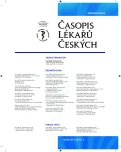Potential interactions between drugs and dietary supplements
Authors:
Hassan Farghali 1; Ludmila Kameníková 1; Jiří Hodis 1,2; Nikolina Kutinová Canová 1
Authors‘ workplace:
Farmakologický ústav 1. LF UK a VFN, Praha
1; Hodis s. r. o., Společnost praktických lékařů pro dospělé, Praha
2
Published in:
Čas. Lék. čes. 2014; 152: 67-71
Category:
Review Article
* Autoři věnují tento článek památce zesnulého MUDr. Norberta Gaiera, CSc., dlouholetého pracovníka Farmakologického ústavu 1. LF UK a člena redakční rady Časopisu lékařů českých.
Overview
Purified active plant constituents were isolated and assessed for their pharmacological activities that constitute a basis of modern drug development. The situation with herbal supplements is different because the extract or dried herb or mixture of herbs contains several substances beside the beneficial one(s) that might produce drug interaction with the conventional medicine(s). Most patients are misinformed and believe that anything “natural” must be safe. This article is focusing on plant-based substances referred as dietary supplements (DS). Examples of reported drug interactions and contraindications associated with DS with two case studies are presented. As supplements are typically not prescribed, many doctors seem to have no interest in drug-DS interactions since a typical medical history of the patients does not include any questions about self-prescribed remedies of this nature. Rather, patients are left alone when they are tempted to try this or that DS and tend to rely on advice from friends, or on material they read on internet. A better quality control, compliance, public awareness and healthcare professional’s vigilance for potential interactions are needed. It is of utmost importance to appreciate the impact of supplements on different stages of pharmacokinetics, especially on drug absorption and metabolism.
Keywords:
dietary supplements – drug interactions – imatinib – garlic – ginseng
Sources
1. Bunchorntavakul C, Reddy KR. Herbal and dietary suplement hepatotoxicity. Aliment Pharmacol Ther 2013; 37 : 3–17.
2. Tsai H-H, Lin H-W, Pickard AS, Mahady GB. Evaluation of documented drug interactions and contraindications associated with herbs and dietary supplements: a systematic literature review. Int J Clin Pract 2012; 66 : 1056–1078.
3. Mohamed MEF, Fry RF. Inhibitory effects of commonly used herbal extracts on UDP-glucuronosyltransferase 1A4, 1A6, and 1A9 enzyme activities. Drug Metab Dispos 2011; 39 : 1522–1528.
4. Izzo AA. Interactions between herbs and conventional drugs: Overview of the clinical data. Med Princ Pract 2012; 21 : 404–428.
5. Berginc K, Kristl A. The effect of garlic supplements and phytochemicals on the ADMET properties of drugs. Expert Opin Drug Metabol Toxicol 2012; 8 : 295–310.
6. Mclay JS, Stewart D, George J, et al. Complementary and alternative medicines use by Scottish women with breast cancer. What, why and the potential for drug interactions? Eur J Clin Pharmacol 2012; 68 : 811–819.
7. Lockwood GB. The quality of commercially available nutraceutical supplements and food sources. J Pharm Pharmacol 2011; 63 : 3–10.
8. Manheimer E, Wieland S, Kimbrough E, et al. Evidence from the Cochrane collaboration for traditional chinese medicine therapies. J Altern Complem Med 2009; 15 : 1001–1014.
9. Flowera A, Wittb C, Liuc JP, et al. Guidelines for randomised controlled trials investigating Chinese herbal medicine. J Ethnopharmacol 2012; 140 : 550–554.
10. Dennehy CE, Tsourounis C. Dietary supplements and herbal medication. In: Katzung BG (ed.). Basic and clinical pharmacology, 12th edition, a LANGE medical book. USA: The McGraw-Hill Companies 2012; 1125–1137.
11. Petroczi A, Taylor G, Naughton DP. Mission impossible? Regulatory and enforcement issues to ensure safety of dietary supplements. Food Chem Toxicol 2011; 49 : 393–402.
12. Fasinu PS, Bouic PJ, Rosenkranz B. An overview of the evidence and mechanisms of herb-drug interactions. Front Pharmacol 2012; 69 : 1–19.
13. Bilgi N, Bell K, Ananthakrishnan AN, Atallah E. Imatinib and Panax ginseng: A potential interaction resulting in liver toxicity. Ann Pharmacother 2010; 44 : 926–928.
14. Yang AK, He SM, Liu L, et al. Herbal Interactions with Anticancer Drugs: Mechanistic and Clinical Considerations. Curr Med Chem 2010; 17 : 1635–1678.
15. Farghali H, Kutinová Canová N, Lekić N. Resveratrol and related compounds as antioxidants with an allosteric mechanism of action in epigenetic drug targets. Physiol Res 2013; 62 : 1–13.
16. Detampel P, Beck M, Krahenbuhl S, Huwyler J. Drug interaction potential of resveratrol. Drug Metabol Rev 2012; 44 : 253–265.
17. Yang CS, Pan E. The effects of green tea polyphenols on drug metabolism. Expert Opin Drug Metabol Toxicol 2012; 8 : 677–689.
18. Gurley BJ. Pharmacokinetic herb-drug interactions (Part 1): Origins, mechanisms, and the impact of botanical dietary supplements. Planta Med 2012; 78 : 1478–1489.
19. Gurley BJ, Fifer EK, Gardner Z. Pharmacokinetic herb-drug interactions (Part 2): Drug interactions involving popular botanical dietary supplements and their clinical relevance. Planta Med 2012; 78 : 1490–1514.
Labels
Addictology Allergology and clinical immunology Angiology Audiology Clinical biochemistry Dermatology & STDs Paediatric gastroenterology Paediatric surgery Paediatric cardiology Paediatric neurology Paediatric ENT Paediatric psychiatry Paediatric rheumatology Diabetology Pharmacy Vascular surgery Pain management Dental HygienistArticle was published in
Journal of Czech Physicians

- Advances in the Treatment of Myasthenia Gravis on the Horizon
- Possibilities of Using Metamizole in the Treatment of Acute Primary Headaches
- Metamizole vs. Tramadol in Postoperative Analgesia
- Spasmolytic Effect of Metamizole
- Metamizole at a Glance and in Practice – Effective Non-Opioid Analgesic for All Ages
-
All articles in this issue
- Potential interactions between drugs and dietary supplements
- Circulating tumor cells and prostate cancer prognosis
- Platelets in the pathogenesis of solid tumors
- Relation of risk factors between metabolic syndrome and nonalcoholic fatty liver disease in children and adolescents
- Some immunological properties of female saliva and its effect on sperm motility
- Journal of Czech Physicians
- Journal archive
- Current issue
- About the journal
Most read in this issue
- Platelets in the pathogenesis of solid tumors
- Some immunological properties of female saliva and its effect on sperm motility
- Potential interactions between drugs and dietary supplements
- Circulating tumor cells and prostate cancer prognosis
